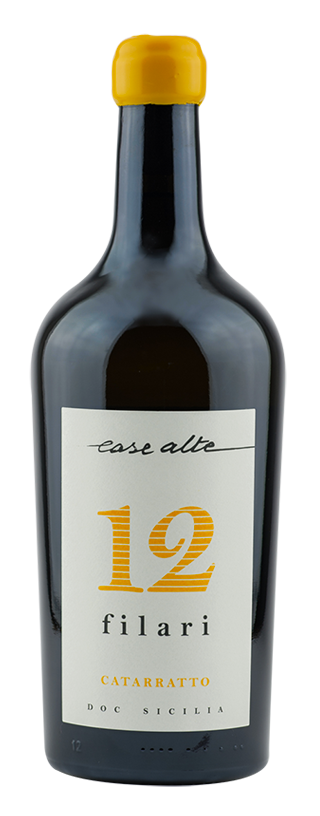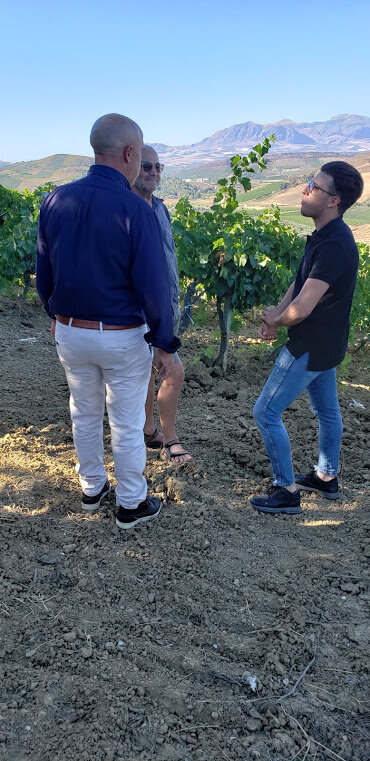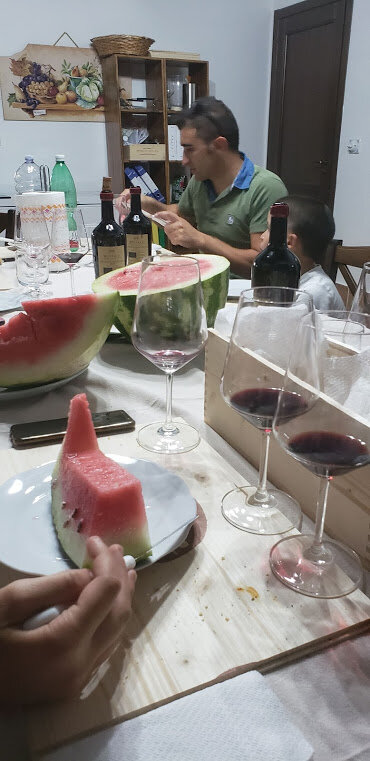Who: Calogero + Giuseppe Vaccaro
Where: Camporeale, Palermo • Sicily - Italy
Founded: 3rd generation, mid 1900’s
Land: 8 hectares, 500 meters above sea level
Grapes: Grillo, Catarratto, Nero d’Avola + Syrah di Macellarotto
Appellation: Sicilia DOC
Viticulture: Organic
Annual Production: about 20,000 btls
Camporeale is a small town of about 4,000 inhabitants, in the province of Palermo, located in the Val di Mazara. It is situated on both sides of the two provinces of Palermo and Trapani, who competed for the fertile territory for about 150 years until I954, which is the year of transition to the administrative district of Palermo. The local economy is based on agriculture and the trading of its main products: wheat, oil, wine and melons.
According to historical and archaeological evidence, the ancient name Macellaro probably derives from the ancient name of Makella, located between Palermo and Segesta, which was destroyed in 260 BC by roman consuls Caio Duilio and Gneo Pompeo. The local economy is based on agriculture and the trading of its main products: wheat, oil, wine, and melons.
For three generations the Vaccaro family has been producing wine in the small farming town of Camporeale; a hilly area characterized by particularly favorable soil and climatic conditions that give rise to an extraordinary production of wines with excellent organoleptic characteristics. It all starts with Giuseppe Vaccaro, highly experienced and deeply in love with his land. In the first half of the last century, Giuseppe realized the potential of this area and he decided to start making wine from the grapes of his own estate, Catarratto and Nerello Mascalese, in his small shop; these wines were destined for the Palermo taverns that quickly began to appreciate the product.
Encouraged by this success, in 1963 Giuseppe decided to expand the business, buy more land and a block of flats in Contrada Macellarotto, in addition to a further ten hectares purchased in 1986. On the hilly property of his house, he set his cellar, and in turn, was given the name of the company Case Alte. Giuseppe, with the help of his son Calogero, undertook the cultivation of Catarratto, Grillo, Syrah and Nero d' Avola, strictly for the purpose of organic farming.
In 2010, encouraged by the interest and participation the third generation joined the family business. The very young son of Calogero, also called Giuseppe, went to school to fine-tune what his family instilled in him. The Vaccaro’s decision to invest in building a small winery in 2015 to produce wine with deep expression and shows the love for their land and for their vineyards definitely paid off. For the past fifty years, what links the family to the Contrada Macellarotto and Case Alte, is a love that looks to the future, with particular attention to issues of sustainability and organic farming, without forgetting the families history and the care that previous generations have dedicated to every single bunch of grapes.
We found Case Alte while on a quest for superior wines from the western part of Sicily. Having not even 1 bottle for us to taste, we waited for the next vintage to be released. Giuseppe sent us 2 of each upon their release and man-oh-man were we in heaven! Soon after we visited them at their hillside winery. The roads in Camporeale are as potholed as they are in the Boston area, thankfully there is no traffic. Young Giuseppe, his parents, and their 2 Maremmano sheepdogs were there waiting for us. What we found was breathtaking views, clean and healthy vineyards in rolling hills, and kind folks with all the time in the world when it came to expressing their love of the lands. This was Sicilian time. Theirs is a pure expression of Sicily- the family arrived and arrived for a mid-day meal, grilled meats, fresh vegetables from the garden, cannoli from the local pastry shop, and the freshest watermelon we have ever had, homegrown of course. When asked where in Italy is best to go, Sicily is always first off our lips, for it is people like the Vaccaros that make it so special and the memories so deep. Giuseppi somehow gets that feeling into every bottle.
*FILARE means wire, loosely translating to row, as in each row of wire used in the trellis system. Thus, it implies how many rows Case Alte has of each grape varietal.
‘Filari 12’ Catarratto
SOIL: hilly, clayish and sandy
ALTITUDE: 500 meters above sea level
AGE OF VINES: replanted1992
TRAINING SYSTEM: espalier rearing with Guyot pruning
VITICULTURE: vineyard conducted according to the principles of biological agriculture with thinning of the bunches in pre veraison.
VINE PER HECTARE: 3.500 YIELD PER HECTARE: 8.0 tonnes
HARVEST: manual harvest and grape selection through small case of 8 kg. After harvest grapes are carried rapidly to the cellar.
FERMENTATION: some hours after harvest grapes are softly crushed, after 24 hours of settling spontaneous fermentation.
AGING: 6 months in steel tanks on the fine lees at a temperature 10°C with weekly battonage and 2 months in the bottle before release.
TASTING NOTES
In the glass: straw yellow with bright green reflections.
On the nose: complex mineral notes with light floral notes such as orange blossom, chamomile, hay, aromatic herbs.
On the palate: extremely balanced characterized by a great freshness supported by good structure and a final pleasantly savory.
‘Filari 4’ Grillo
ANNUAL PRODUCTION: 1320
SOIL: hilly, clayish and sandy
ALTITUDE: 500 meters above sea level
AGE OF VINES: replanted 2005
TRAINING SYSTEM: espalier rearing with Guyot pruning
VITICULTURE: vineyard conducted according to the principles of biological agriculture with thinning of the bunches in pre-veraison.
VINES PER HECTARE: 3.600 YIELD PER HECTARE: 6.0 tonnes
HARVESTING: manual harvest and grape selection through small case of 8 kg. After harvest grapes are carried rapidly to the cellar.
FERMENTATION: some hours after harvest grapes are softly crushed, after 24 hours of settling, spontaneous fermentation.
AGING: 6 months in steel tanks on the fine lees at a temperature 10°C with weekly battonage and 2 months in the bottle before release.
TASTING NOTES
In the glass: straw yellow with bright green reflections.
On the nose: tropical notes like grapefruit, elderberry, fig leaf alternate with delicate notes of orange blossom and crusty bread.
On the palate: full-width, characterized by good acidity and great flavor on the finish.
‘Filari 16’ Nero d’Avola
ANNUAL PRODUCTION: 2650
SOIL: hilly, clayish and sandy
ALTITUDE: 500 meters above sea level
AGE OF VINES: replated1998
TRAINING SYSTEM: espalier rearing with Guyot pruning
VITICULTURE: vineyard conducted according to the principles of biological agriculture with thinning of the bunches in pre-veraison.
VINES PER HECTARE: 3.500. YIELD PER HECTARE: 6.0 tonnes
HARVESTING: manual harvest and grape selection through small case of 8 kg. After harvest grapes are carried rapidly to the cellar.
FERMENTATION: after de-stemming, the grapes are fermented in small stainless steel tanks, spontaneous fermentation. During maceration, 10-12 days, are made breaks of daily cap by manual punching. After racking, malolactic fermentation takes place in steel tanks with indigenous lactic bacteria.
AGING: 8 months in French oak casks, 6 months in bottle before release.
TASTING NOTES
In the glass: deep ruby red with light violet reflections.
On the nose: notes varied, ranging from fruity notes of blackberries, cherries, raspberries those spicy rosemary, tobacco, cloves.
On the palate: large structure with balanced acidity and fine tannins, silky but alive and well present to confer the right vivacity and nice length to the wine.
Syrah di Macellarotto
SOIL: hilly, sandy-sandy with a good presence of skeleton
ALTITUDE: 500 meters above sea level
AGE OF VINE: replated1998
TRAINING SYSTEM: Guyot trained espalier
VITICULTURE: vineyard conducted according to the principles of organic agriculture with thinning of the bunches in pre-veraison.
PLANTS PER HECTARE: 3,600 YIELD PER HECTARE 50 quintals/hectare
HARVEST: manual harvesting early in the morning and delivery to the cellar with small 8 kg crates.
FERMENTATION: after destemming, the grapes ferment in small steel tanks with selected yeasts at 23 ° C. During the maceration of 10-12 days, daily hat breaks are carried out by manual punching down. After racking, malolactic fermentation takes place in steel tanks with indigenous lactic acid bacteria.
AGING: 12 months in French oak tonneau, 12 months in bottle before release.
TASTING NOTES
In the glass: deep ruby red with light purple reflections.
On the nose: balance between fruity notes of blackberry and black currant and classic spicy notes of black pepper and graphite.
On the palate: very broad, with very fine tannins supported by good acidity which gives great balance and length on the finish.
Via Pisciotta, 27, 90043 Contrada Macellarotto, Camporeale PA, Italy
+39 329 653 4779


















